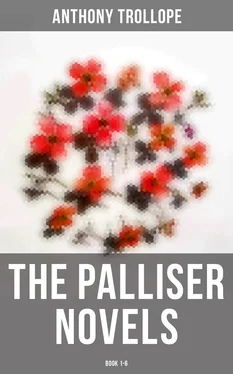But she had once loved her cousin. Yes, truly it was so. In her thoughts she did not now deny it. She had loved him, and was tormented by a feeling that she had had a more full delight in that love than in this other that had sprung up subsequently. She had told herself that this had come of her youth;—that love at twenty was sweeter than it could be afterwards. There had been a something of rapture in that earlier dream which could never be repeated,—which could never live, indeed, except in a dream. Now, now that she was older and perhaps wiser, love meant a partnership, in which each partner would be honest to the other, in which each would wish and strive for the other's welfare, so that thus their joint welfare might be insured. Then, in those early girlish days, it had meant a total abnegation of self. The one was of earth, and therefore possible. The other had been a ray from heaven,—and impossible, except in a dream.
And she had been mistaken in her first love. She admitted that frankly. He whom she had worshipped had been an idol of clay, and she knew that it was well for her to have abandoned that idolatry. He had not only been untrue to her, but, worse than that, had been false in excusing his untruth. He had not only promised falsely, but had made such promises with a deliberate, premeditated falsehood. And he had been selfish, coldly selfish, weighing the value of his own low lusts against that of her holy love. She had known this, and had parted from him with an oath to herself that no promised contrition on his part should ever bring them again together. But she had pardoned him as a man, though never as a lover, and had bade him welcome again as a cousin and as her friend's brother. She had again become very anxious as to his career, not hiding her regard, but professing that anxiety aloud. She knew him to be clever, ambitious, bold,—and she believed even yet, in spite of her own experience, that he might not be bad at heart. Now, as she told herself that in truth she loved the man to whom her troth was plighted, I fear that she almost thought more of that other man from whom she had torn herself asunder.
"Why should he find himself unhappy in London?" she said, as she went back to the letter. "Why should he pretend to condemn the very place which most men find the fittest for all their energies? Were I a man, no earthly consideration should induce me to live elsewhere. It is odd how we differ in all things. However brilliant might be his own light, he would be contented to hide it under a bushel!"
And at last she recurred to that matter as to which she had been so anxious when she first opened her lover's letter. It will be remembered how assured she had expressed herself that Mr. Grey would not condescend to object to her travelling with her cousin. He had not so condescended. He had written on the matter with a pleasant joke, like a gentleman as he was, disdaining to allude to the past passages in the life of her whom he loved, abstaining even from expressing anything that might be taken as a permission on his part. There had been in Alice's words, as she told him of their proposed plan, a something that had betrayed a tremor in her thoughts. She had studiously striven so to frame her phrases that her tale might be told as any other simple statement,—as though there had been no trembling in her mind as she wrote. But she had failed, and she knew that she had failed. She had failed; and he had read all her effort and all her failure. She was quite conscious of this; she felt it thoroughly; and she knew that he was noble and a gentleman to the last drop of his blood. And yet—yet—yet there was almost a feeling of disappointment in that he had not written such a letter as Lady Macleod had anticipated.
During the next week Lady Macleod still came almost daily to Queen Anne Street, but nothing further was said between her and Miss Vavasor as to the Swiss tour; nor were any questions asked about Mr.. Grey's opinion on the subject. The old lady of course discovered that there was no quarrel, or, as she believed, any probability of a quarrel; and with that she was obliged to be contented. Nor did she again on this occasion attempt to take Alice to Lady Midlothian's. Indeed, their usual subjects of conversation were almost abandoned, and Lady Macleod's visits, though they were as constant as heretofore, were not so long. She did not dare to talk about Mr. Grey, and because she did not so dare, was determined to regard herself as in a degree ill-used. So she was silent, reserved, and fretful. At length came the last day of her London season, and her last visit to her niece. "I would come because it's my last day," said Lady Macleod; "but really I'm so hurried, and have so many things to do, that I hardly know how to manage it."
"It's very kind," said Alice, giving her aunt an affectionate squeeze of the hand.
"I'm keeping the cab, so I can just stay twenty-five minutes. I've marked the time accurately, but I know the man will swear it's over the half-hour."
"You'll have no more trouble about cabs, aunt, when you are back in Cheltenham."
"The flies are worse, my dear. I really think they're worse. I pay the bill every month, but they've always one down that I didn't have. It's the regular practice, for I've had them from all the men in the place."
"It's hard enough to find honest men anywhere, I suppose."
"Or honest women either. What do you think of Mrs. Green wanting to charge me for an extra week, because she says I didn't give her notice till Tuesday morning? I won't pay her, and she may stop my things if she dares. However, it's the last time. I shall never come up to London again, my dear."
"Oh, aunt, don't say that!"
"But I do say it, my dear. What should an old woman like me do, trailing up to town every year, merely because it's what people choose to call the season."
"To see your friends, of course. Age doesn't matter when a person's health is so good as yours."
"If you knew what I suffer from lumbago,—though I must say coming to London always does cure that for the time. But as for friends—! Well, I suppose one has no right to complain when one gets to be as old as I am; but I declare I believe that those I love best would sooner be without me than with me."
"Do you mean me, aunt?"
"No, my dear, I don't mean you. Of course my life would have been very different if you could have consented to remain with me till you were married. But I didn't mean you. I don't know that I meant any one. You shouldn't mind what an old woman like me says."
"You're a little melancholy because you're going away."
"No, indeed. I don't know why I stayed the last week. I did say to Lady Midlothian that I thought I should go on the 20th; and, though I know that she knew that I really didn't go, she has not once sent to me since. To be sure they've been out every night; but I thought she might have asked me to come and lunch. It's so very lonely dining by myself in lodgings in London."
"And yet you never will come and dine with me."
"No, my dear; no. But we won't talk about that. I've just one word more to say. Let me see. I've just six minutes to stay. I've made up my mind that I'll never come up to town again,—except for one thing."
"And what's that, aunt?" Alice, as she asked the question, well knew what that one thing was.
"I'll come for your marriage, my dear. I do hope you will not keep me long waiting."
"Ah! I can't make any promise. There's no knowing when that may be."
"And why should there be no knowing? I always think that when a girl is once engaged the sooner she's married the better. There may be reasons for delay on the gentleman's part."
"There very often are, you know,"
"But, Alice, you don't mean to say that Mr. Grey is putting it off?"
Alice was silent for a moment, during which Lady Macleod's face assumed a look of almost tragic horror. Was there something wrong on Mr. Grey's side of which she was altogether unaware? Alice, though for a second or two she had been guilty of a slight playful deceit, was too honest to allow the impression to remain. "No, aunt," she said; "Mr. Grey is not putting it off. It has been left to me to fix the time."
Читать дальше












